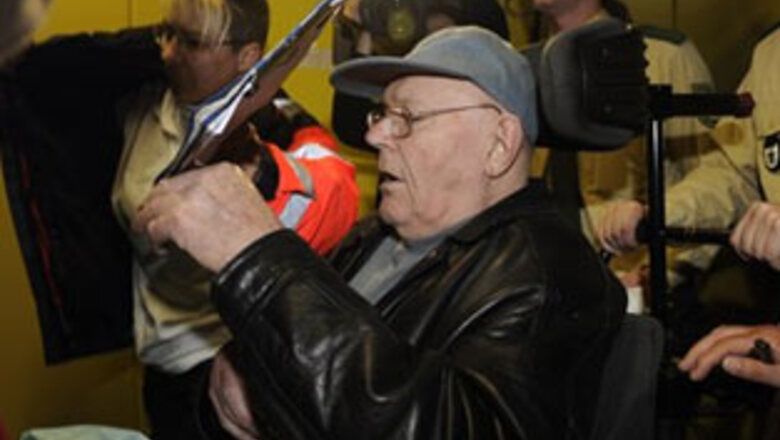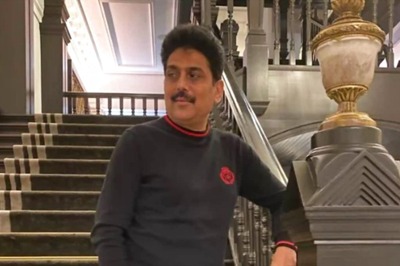
views
Berlin: John Demjanjuk suffers from bouts of mental absence and will enter court in a wheelchair on Monday to fight charges of helping to kill 27,900 Jews in the Holocaust, the 89-year-old's lawyer said.
His victims' families insist he must face justice.
In what is set to be Germany's last big Nazi-era war crimes trial, all eyes will be on the Ukrainian-born former US auto worker who fought in the Red Army before being captured by the Nazis and recruited as a concentration camp guard.
German state prosecutors believe Demjanjuk, who was top of the Simon Wiesenthal Center's list of most-wanted war criminals, assisted in murders at Sobibor extermination camp in Poland where at least 2,50,000 Jews were murdered.
Demjanjuk, extradited in May from the United States after months of legal wrangling, denies involvement in the Holocaust.
"His physical condition alters by the day, even by the hour. He is an old man suffering from a range of ailments," Demjanjuk's lawyer, Guenther Maull, told Reuters.
"His mood swings, too. Sometimes you think he as an old man who is mentally absent but you don't know if it's a general condition or an illness," he said, adding Demjanjuk would attend the trial in a wheelchair and address the court in Ukrainian.
Despite protestations from his family, medics have deemed Demjanjuk fit for trial but hearings, in Munich, will be limited to two 90-minute sessions per day due to his frail condition.
The trial is due to last until May and Demjanjuk could be sentenced to spend the rest of his life behind bars.
"It is an opportunity to demonstrate what inhuman behaviour the Nazi regime executed and to respect my family's memory," said David van Huiden, a Dutch co-plaintiff whose parents and 18-year-old sister were gassed at Sobibor.
"He should get the heaviest available punishment according to German law," he told Reuters.
The Wiesenthal Centre, which says Demjanjuk pushed men, women and children into gas chambers, says the trial sends a message that justice can be done even after decades.
"John Demjanjuk has lived a largely undisturbed life. He has been with his family, celebrated birthdays and anniversaries, something his victims didn't have the chance to do," said Rabbi Marvin Hier, Dean of the Centre in Los Angeles. "Do we have compassion? No, not at all. He'll be in court where he belongs."
PAGE_BREAK
Patchy record
Many Germans, keen to draw a line under the Nazi past and forge a new role for their country, are resigned to the spectacle of the trial which has underscored Germany's patchy record on bringing its Nazi war criminals to justice.
The Institute for Contemporary History in Munich says West Germany has seen only about 6,600 convictions. About two thirds of those individuals got sentences of less than two years in jail. There are no reliable figures for Communist East Germany.
"There have been many investigations but if you look at the dimensions of the crimes, the results are unsatisfactory," said Andreas Eichmueller, a Nazi war crime expert at the Institute.
While acknowledging he was at other camps, Demjanjuk has denied he was in Sobibor, which prosecutors say was run by 20-30 SS members and 100-150 former Soviet prisoners of war.
In the gas chambers, Jews died within 30 minutes of a toxic mix of carbon monoxide and carbon dioxide, say prosecutors who argue Demjanjuk was at Sobibor for about six months in 1943.
Experts say the trial's most interesting aspect is whether prosecutors can prove Demjanjuk was party to specific crimes.
"The court will enter new ground if it convicts him just because he was there. Usually there has to be proof of a concrete crime," said Eichmueller.
"The prosecutors seem to be saying purely because he was in an extermination camp, he was involved in murder. That's different from proving an actual crime," said Eichmueller.
Demjanjuk was extradited from the United States to Israel in 1986, accused of being "Ivan the Terrible," a notoriously sadistic guard at the Treblinka death camp. He was sentenced to death in 1988 but his conviction was overturned when new evidence showed another man was probably "Ivan."



















Comments
0 comment